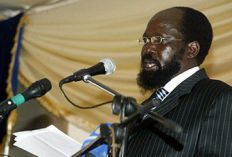Sudan to mark north-south border by end 2008 – Kiir
July 19, 2007 (BEIJING) — Sudan may begin to mark the boundary between north and south by the end of the year to overcome a key point of dispute between former foes, Sudanese First Vice President Salva Kiir said on Thursday.

Under the deal the border commission should demarcate the north-south boundary, a sensitive issue ahead of a pre-election census. Many of Sudan’s largest oil fields, which pump more than 500,000 barrels per day, lie along the disputed frontier.
“A border commission has been formed and they have started moving to recce (do reconnaissance on) the border areas and to talk to the local population to find out what landmarks used to demarcate the border,” Kiir said during a visit to Beijing.
“Maybe toward the end of this year, after the rains, this committee will implement their functions of demarcating the border. Toward the end of next year I think we will get a final report from this commission,” he told a news conference.
South Sudan can vote in a referendum on secession by 2011. The semi-autonomous southern region gets around 50 percent of revenues from oil in south Sudan and its budget is almost entirely dependent on them so demarcation of the border is key.
While visiting China, a major investor in Sudan’s oil sector, southerner Kiir assured business leaders Sudan would protect their safety and respect contracts signed before the war, and he said Chinese oil exploration could continue to expand in Sudan, although he gave few details.
China’s top state-run energy group, China National Petroleum Corp. (CNPC), the parent of oil and gas firm PetroChina <0857.HK>
Kiir said there were no new deals agreed during his trip to Beijing, though he discussed opportunities in southern Sudan with the Chinese business community on Thursday.
Two huge oil blocks in south Sudan were in dispute between major oil companies who signed with the northern government prior to the civil war and smaller firms who signed with Kiir’s former rebel Sudan People’s Liberation Movement (SPLM) during the conflict.
But earlier this month the north-south partners in peace ruled to uphold exisiting contracts signed prior to the war, a move which encouraged investors.
Kiir said even if south Sudan decided to separate, the government would continue to uphold any prior contracts signed with Khartoum’s coalition.
(Reuters)
